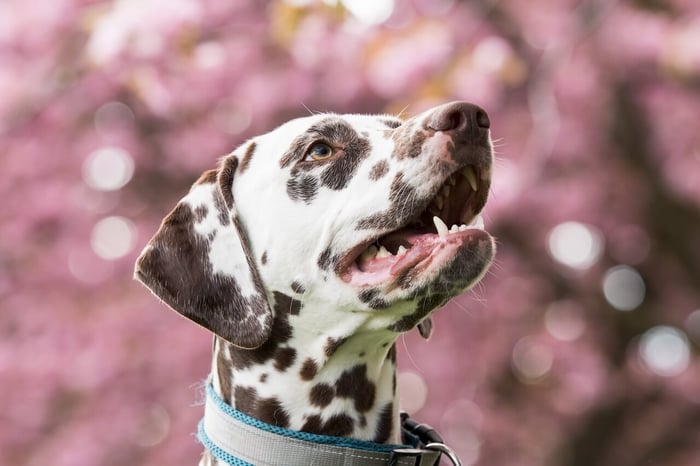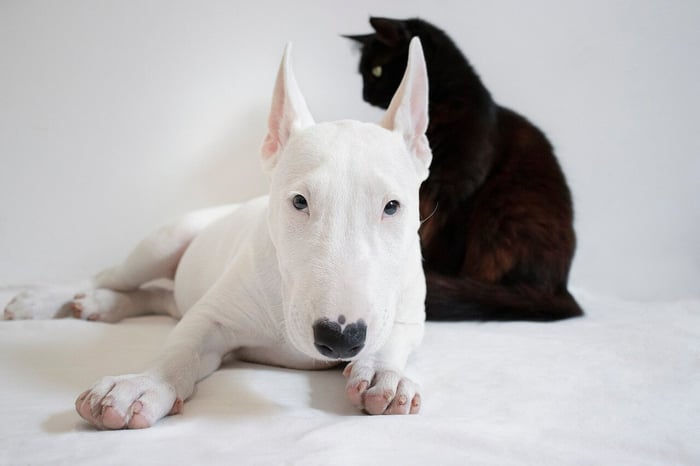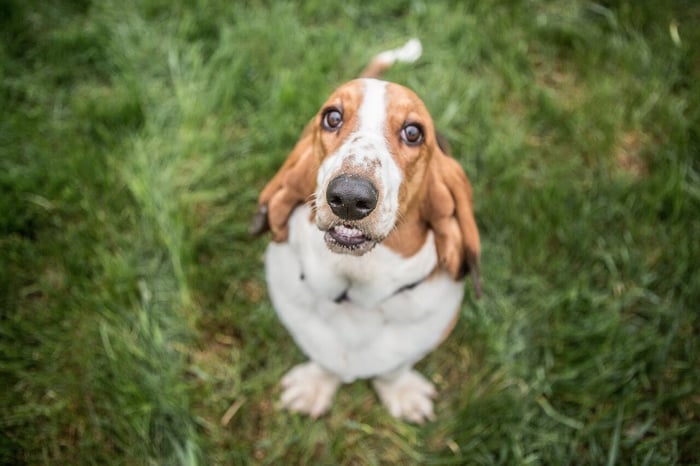The Dalmatian is one of the most recognized dog breeds, celebrated for its distinctive spots and long history as a carriage dog and firehouse dog. Known for their energy, intelligence, and loyalty, Dalmatians are ideal for active families and individuals who appreciate a playful, attentive companion. This guide dives into the unique characteristics, care needs, and fascinating history of the Dalmatian breed.
Physical Characteristics of the Dalmatian Dog
Few dog breeds are as immediately recognizable as the iconic Dalmatian breed. Renowned for their striking spotted coat featuring a pure white coat with clearly defined black or brown spots, Dalmatians capture attention wherever they go. While most famously known as firehouse mascots and historic carriage dogs (coach dogs), their unique appearance goes far beyond just their spots.
One fascinating fact about Dalmatians is that Dalmatian puppies are born without visible spots, sporting an entirely white coat at birth. Within a few weeks, their distinctive spots gradually appear, creating the familiar pattern that makes this breed stand out from other breeds.
Their athletic bodies, originally bred for endurance while running alongside horse-drawn fire engines, reflect their heritage as tireless companions and dependable guard dogs. With muscular, lean physiques built for agility and stamina, these dogs require substantial daily exercise and regular walks to stay healthy and content.
Another unique characteristic of Dalmatians is their eyes, which often appear deep and expressive. While most have brown eyes, some possess strikingly beautiful blue eyes, enhancing their already captivating look. Their soft, floppy ears, often featuring matching spots, add to their friendly and approachable appearance.
Beyond appearance, special breed-specific health considerations are important. Due to genetics, many Dalmatians may experience deafness (in one ear or both), making early BAER testing crucial. They're also uniquely prone to developing kidney stones due to elevated uric acid levels, especially if not bred from LUA Dalmatians.
Whether drawn to their historical prestige as status symbols or simply enchanted by their charming appearance, prospective owners should know that with proper care, regular veterinary check-ups with their vet, and responsible breeding practices from trusted breeders, these spotted dogs can live long, healthy, and vibrant lives as loyal, engaging family pets.

Dalmatian Temperament and Dalmatian Personality
The Dalmatian dog breed is known not only for its striking spotted coat and history as a carriage dog but also for its friendly, playful, and highly energetic nature. Originally bred for running alongside horse-drawn fire engines, these spotted dogs possess impressive stamina and require plenty of daily exercise, including regular trips outdoors and active play sessions.
Dalmatians are famously loyal and devoted to their owners, making them excellent family companions and dependable watchdogs. Their protective instinct, dating back to their role as historic firehouse mascots, means they may initially be reserved with strangers, though they quickly warm up when properly introduced and well socialized from the time they are puppies.
Due to their intelligence, the Dalmatian breed is generally responsive to consistent, positive training methods. However, they can sometimes display stubbornness—especially if not provided adequate mental stimulation. For this reason, pet parents should plan on investing extra attention into their training routines, socialization with other dogs and animals, and regular interaction with small children under supervision.
This breed thrives on companionship and prefers to spend time alongside their human families rather than being left alone. Most behavioral issues in Dalmatians stem from boredom or insufficient activity, reinforcing the need for regular exercise, including daily walks, games, or structured sports. Providing outlets for their natural energy will ensure your Dalmatian remains happy and balanced.
Potential Dalmatian owners should also consider special considerations unique to this breed. Deafness can occur, so choosing a responsible breeder who performs BAER testing on their Dalmatian puppies is essential. Additionally, due to the breed’s unique metabolism involving uric acid, diet must be managed carefully to avoid health concerns such as kidney stones, especially in non-LUA Dalmatians.
In short, the charming personality and captivating energy of this beloved spotted breed have made Dalmatians not only a timeless status symbol recognized by the American Kennel Club (AKC) but also a beloved pet for active families who cherish a lively, affectionate, and engaging companion.
Health and Care Considerations for a Dalmatian Dog
The Dalmatian breed, known for its distinctive black or brown spots, energetic spirit, and history as a carriage dog and firehouse mascot, also comes with some special considerations that potential owners should understand. While this spotted breed is admired for its beauty and stamina, there are a few important health and care factors to keep in mind.
Deafness in Dalmatians
Deafness is one of the most common inherited conditions in Dalmatian puppies. Some are born deaf in one ear, while others may have complete hearing loss. Because of this, reputable breeders should perform BAER testing (Brainstem Auditory Evoked Response) to confirm hearing status early on. Despite this challenge, deaf Dalmatians can live full, happy lives with proper training and visual communication techniques.
Risk of Kidney Stones
Unlike many other breeds, the Dalmatian dog has a unique genetic trait that affects how their body processes uric acid, which can lead to painful kidney stones or urinary tract issues. Feeding your dog a carefully managed diet, avoiding table scraps, and encouraging hydration with clean water at all times are key steps in prevention. Many owners now seek LUA Dalmatians, a line developed to reduce this health risk through selective breeding.
Joint and Bone Health
As a highly energetic dog breed originally bred to run alongside horse-drawn fire engines, Dalmatians thrive on daily exercise like long walks, playtime, and regular trips outdoors. However, their active lifestyle makes them susceptible to hip dysplasia, especially if they aren’t getting the right balance of movement and joint support. Providing orthopedic dog beds and joint-friendly diets can make a big difference in their comfort as they age.
Donut Orthopedic Dog Bed

$47.99
Dog Bed - Donut is like a donut gently hugging your puppy, making them feel comfortable and secure. Protects bones: The interior is filled with 3D high-density orthopedic sponge as well as pp cotton filled with full edges, which can relieve… read more
Coat & Skin Maintenance
Even with their short, sleek white coat, Dalmatians are year-round shedders. Weekly brushing helps remove dead hairs and keep the spotted coat healthy. Though occasional baths are sufficient, it’s important to use gentle, dog-safe shampoos to avoid skin irritation. Regular grooming also gives you a chance to check for allergies, bumps, or irritations common in this dog breed.
Lifestyle and Environment
Because of their background as a guard dog and coach dog, Dalmatians are protective and deeply attached to their human parents. They prefer to spend time with family and don’t do well left alone for long periods. This breed thrives best in homes with owners who understand their exercise needs and have the time to offer daily attention and enrichment.
They can be excellent companions for children and coexist peacefully with other animals, but only when well socialized early. Their strong prey drive and alert nature, however, may require training and supervision around small children or other dogs.

Training and Socialization
Training and socialization are key to raising a happy, well-behaved Dalmatian. Since Dalmatians can have a strong-willed and independent nature, starting training and socialization early can help prevent behavioral issues and encourage them to grow into confident, well-adjusted adults. Using positive reinforcement methods—like treats, praise, and play—can make training sessions enjoyable and effective, as Dalmatians are sensitive and respond best to gentle guidance rather than harsh correction.
Socialization is equally important. Without early exposure, Dalmatians may become cautious around strangers and other dogs. Introducing your puppy to a variety of people, settings, and other dogs during their formative months can help them become more comfortable and friendly. Puppy classes, playdates, and regular outings provide valuable social experiences that build confidence. With a bit of patience, consistency, and encouragement, your Dalmatian will learn to follow commands and behave well in different situations, making them a wonderful companion for any setting.
Grooming Tips for a Sleek Dalmatian Coat
The iconic Dalmatian breed is instantly recognizable thanks to its stunning white coat adorned with distinctive black or brown spots. While their short, smooth spotted coat is easy to maintain compared to other breeds, regular grooming is essential to keep it healthy and shiny.
Because Dalmatians continuously shed their coat, weekly brushing is highly recommended. Brushing not only removes dead hairs and reduces shedding around your home but also distributes natural skin oils, promoting a sleek, healthy appearance. A grooming glove or soft-bristle brush is ideal for keeping your Dalmatian looking their best.
Dalmatians typically require only occasional baths—usually every 4-6 weeks or as advised by your vet. Bathing too frequently can strip their coat of essential oils, potentially causing dryness or irritation. Always choose gentle shampoos formulated specifically for short-haired dogs or sensitive skin to protect your Dalmatian's delicate skin.
Besides regular grooming, routine checks for skin irritations, allergies, or unusual spots are important. Due to the breed’s sensitivity, especially in Dalmatian puppies, inspecting their ears, paws, and skin during grooming sessions helps catch potential problems early.
Nail trimming and ear cleaning should also be part of your Dalmatian’s grooming routine. Regular ear inspections help prevent infections, particularly for those Dalmatians prone to hearing issues or deafness. Ensuring nails remain trimmed contributes to their comfort during active play, daily walks, and regular exercise.
Finally, maintaining your Dalmatian's sleek appearance isn’t limited to grooming—diet also matters. Providing quality nutrition helps minimize shedding, supports skin health, and reduces risks associated with special breed-related health concerns such as uric acid buildup and kidney stones.
Consistent grooming not only keeps your Dalmatian beautiful but also strengthens your bond, contributing to a happy, healthy, and well-socialized pet.
Conclusion
Dalmatians offer more, than their eye catching spots and popularity in the media. They bring a combination of happiness, vitality and devotion to any household. Their playful demeanor and loving temperament make them companions for families those, with an active lifestyle.
Dalmatians are a breed to have. Its important to keep in mind that they need proper care, regular exercise and consistent training. They do best with owners who understand and fulfill their emotional requirements. If you're prepared, for the responsibility a Dalmatian can bring love and energy into your life providing companionship that's truly unmatched.











